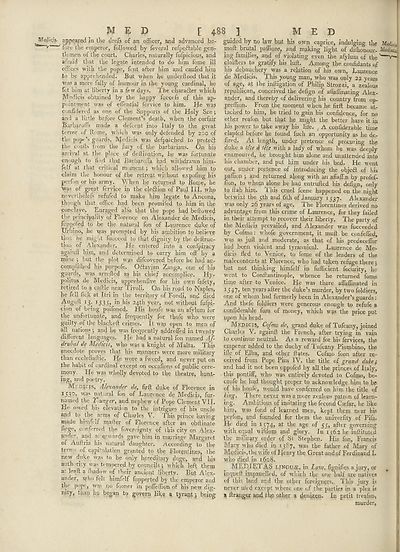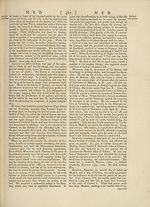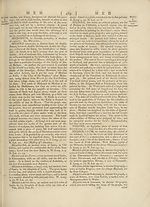Encyclopaedia Britannica, or, a Dictionary of arts, sciences, and miscellaneous literature : enlarged and improved. Illustrated with nearly six hundred engravings > Volume 13, MAT-MIC
(530) Page 488
Download files
Complete book:
Individual page:
Thumbnail gallery: Grid view | List view

MED [ 488 ] MED
ity?- appeared in the dref? of an officer, and advanced be-
fore the emperor, followed by feveral refpeflable gen¬
tlemen of the court. Charles, naturally fufpicious, and
afraid that the legate intended to do him fome ill
offices with the pope, font after him and caufed him
to be apprehended. But when he underllood that it
was a mere fally of humour in the young cardinal, he
fe t h im at liberty in a few days. The character which
Medicis obtained by the happy fuccc-fs of this ap¬
pointment was of effential fervice to him. He 'was
confidered as one of the Supports of the Holy See j
and a little before Clement’s death, when the corfair
Barbaroflh made a defeent into Italy to the great
terror of Rome, which was only defended by 200 of
the pope’s guards, Medic is was defpatched to protect
the courts from the fury of the barbarians. On his
arrival at the place of dertination, lie was fortunate
enough to find that Barbaroila had withdrawn him-
felf at that critical moment ; which allowed him to
claim the honour of the retreat without expofing his
perfon or his army. When he returned to Rome, he
was of great fervice in the election of Paul III. who
neverthelefs refufed to make him legate to Ancona,
though that office had been promifed to him in the
conclave. Enraged alio that the pope had bellowed
the principality of Florence on Alexander de Medicis,
fuppofed to be the natural fon of Laurence duke of
tlrbino, he was prompted by his ambition to belfev.c
that he might fucceed to that dignity by the deftruc-
tion of Alexander. He entered into a confpiracy
againft him, and determined to carry him off by a
mine ; but the plot was difeovered before he had ac-
compliffied his purpofe. Octavian Zanga, one of his
guards, was arrefted as his chief accomplice. Hy-
politus de Medicis, apprehenfive for his own fafety,
retired to a caftle near Tivoli. On his road to Naples,
he fell Tick at Itri in the territory of Fondi, and died
Angult 13. 1535, in his 24th year, not without fufpi-
cion of being poifoned. His houfe was an afylum for
the unfortunate, and frequently for thofe who rvere
guilty of the blacked: crimes. It was open to men of
all nations; and he was frequently addreffed in twenty
different languages. He had a natural fon named Af-
druhal de Medicis, who was a knight of Malta. This
anecdote proves that his manners were more military
than ecclefiartic. lie wore a fword, and never put on
the habit of cardinal except on occafions of public cere¬
mony. He was wholly devoted to the theatre, hunt¬
ing, and poetry.
Mudjcis, Alexander de, firft duke of Florence in
I53°» 'v'as natural fon of Laurence de Medicis, fur-
named the Tiunger, and nephew of Pope Clement VII.
He owed his elevation to the intrigues of his uncle
and to the arms of Charles V. This prince having
made himfelf marter of Florence after an obrtinate
ffege, conferred the fovereignty of ibis city on Alex-
ande’-. and at erwards gave him in marriage Margaret
of Aullria Ins natural daughter. According to the
terms of capitulation granted to the Florentines, the
new duke was to be only hereditary doge, and his
authority was tempered by councils ; which left them
av leaft a ffiadow of their ancient liberty. But Alex¬
ander, who fell himfelf fupported by the emperor and
the pope, was no fooner in poffeffion of his new dig¬
nity, than he began to govern like a tyraiff J being-
guided by no law but his own caprice, indulging the Medicis
moft brutal paffions, and making light of difhonour- Medieta;
ing families, and of violating even the alylum of the
cloifters to gratify his luff. Among the confidants of
his debauchery was a relation of his own, Laurence
de Medicis. This young man, who was only 22 years
of age, at the mitigation of Philip Strozzi, a zealous
republican, conceived the defign of aflaffinating Alex¬
ander, and thereby of delivering his country from op-
preffion. From the moment when he firft became at¬
tached to him, he tried to gain his confidence, for no
other reafon but that he might the better have it la
his power to take away his life. A confiderable time
elapled before he found fuch an opportunity as he de-
fired. At length, under pretence of procuring the
duke a tete a tete with a lady of whom he was deeply
enamoured, he brought him alone and unattended into
his chamber, and put him under his bed. He went
out, unuer pretence of introducing the objedl of his
paffion ; and returned along with an aflaffin by profef-
fion, to whom alone be had entrufted his defign, only
to rtab him. ihis cruel feene happened on the ni^ht
betwixt the 5th and 6th of January 1537. Alexander
was only 26 years of age. The Florentines derived no
advantage from this crime of Laurence, for they failed
in their attempt to recover their liberty. The party of
the Medicis prevailed, and Alexander was fuceeeded
by Cofmo: whofe government, it muff be confefted,
was as juft and moderate, as that of his predeceflor
had been violent and tyrannical. Laurence de Me*-
dicis flit’d to Venice, to fome of the leaders of the
malecontents at Florence, who had taken refuge there $
but not thinking himfelf in fuffieient fecurity, he
went to Conftantinople, whence he returned fome
time after to Venice. He was there affaffinated in
1547, ten years after the duke’s murder, by two foldiers,
one of whom had formerly been in Alexander’s guards;
And thefe foldiers were generous enough to refufe a
confiderable fum of money, w'hich was the price put
upon his head.
Mepicis, Cofmo de, grapd duke of Tufcany, joined
Charles V. againft the French, after trying in vain
to continue neutral. As a reward for Ids fervices, the
emperor added to the duchy of Tufcany Piombino, the
ifle of Elba, and othgr ftates. Cofiuo foon after re¬
ceived from Pope Pius IV. the title of grand duke;
and had it not been eppofed by all the princes of Italy,
this pontiff, who was entirely devoted to Coftno, be-
caufe he had thought proper to acknowledge him to be
of his houfe, would have conferred on him the title of
king. There never was a more zealous patron of learn¬
ing. Ambitious of imitating the fecond Cartar, he like
him, wa* fond of learned men, kept them near his
perfojo, and founded for them the uniyerfity of Fifa.
He died in I574> al: ^ie age °f 55» .aftt:t governing
with equal wifdom and glory. In 1^62 he inftituted
the military order of St Stephen. His fon, Francis
Mary whp died in 13 87, was the father of Mary of
Medicis, the w ife of Henry the Great and of Ferdinand I.
who died in 1608.
MEDTEI AS LlNOUig, in Laiv, fignifies a jury, or #
inqueft impanelled, of which the one half are natives
of this land and the other foreigners.. This jury is
never uit d except where one of the parties in a plea is
a ftranger and th,e other a denizen. In petit treafon,
murder.
ity?- appeared in the dref? of an officer, and advanced be-
fore the emperor, followed by feveral refpeflable gen¬
tlemen of the court. Charles, naturally fufpicious, and
afraid that the legate intended to do him fome ill
offices with the pope, font after him and caufed him
to be apprehended. But when he underllood that it
was a mere fally of humour in the young cardinal, he
fe t h im at liberty in a few days. The character which
Medicis obtained by the happy fuccc-fs of this ap¬
pointment was of effential fervice to him. He 'was
confidered as one of the Supports of the Holy See j
and a little before Clement’s death, when the corfair
Barbaroflh made a defeent into Italy to the great
terror of Rome, which was only defended by 200 of
the pope’s guards, Medic is was defpatched to protect
the courts from the fury of the barbarians. On his
arrival at the place of dertination, lie was fortunate
enough to find that Barbaroila had withdrawn him-
felf at that critical moment ; which allowed him to
claim the honour of the retreat without expofing his
perfon or his army. When he returned to Rome, he
was of great fervice in the election of Paul III. who
neverthelefs refufed to make him legate to Ancona,
though that office had been promifed to him in the
conclave. Enraged alio that the pope had bellowed
the principality of Florence on Alexander de Medicis,
fuppofed to be the natural fon of Laurence duke of
tlrbino, he was prompted by his ambition to belfev.c
that he might fucceed to that dignity by the deftruc-
tion of Alexander. He entered into a confpiracy
againft him, and determined to carry him off by a
mine ; but the plot was difeovered before he had ac-
compliffied his purpofe. Octavian Zanga, one of his
guards, was arrefted as his chief accomplice. Hy-
politus de Medicis, apprehenfive for his own fafety,
retired to a caftle near Tivoli. On his road to Naples,
he fell Tick at Itri in the territory of Fondi, and died
Angult 13. 1535, in his 24th year, not without fufpi-
cion of being poifoned. His houfe was an afylum for
the unfortunate, and frequently for thofe who rvere
guilty of the blacked: crimes. It was open to men of
all nations; and he was frequently addreffed in twenty
different languages. He had a natural fon named Af-
druhal de Medicis, who was a knight of Malta. This
anecdote proves that his manners were more military
than ecclefiartic. lie wore a fword, and never put on
the habit of cardinal except on occafions of public cere¬
mony. He was wholly devoted to the theatre, hunt¬
ing, and poetry.
Mudjcis, Alexander de, firft duke of Florence in
I53°» 'v'as natural fon of Laurence de Medicis, fur-
named the Tiunger, and nephew of Pope Clement VII.
He owed his elevation to the intrigues of his uncle
and to the arms of Charles V. This prince having
made himfelf marter of Florence after an obrtinate
ffege, conferred the fovereignty of ibis city on Alex-
ande’-. and at erwards gave him in marriage Margaret
of Aullria Ins natural daughter. According to the
terms of capitulation granted to the Florentines, the
new duke was to be only hereditary doge, and his
authority was tempered by councils ; which left them
av leaft a ffiadow of their ancient liberty. But Alex¬
ander, who fell himfelf fupported by the emperor and
the pope, was no fooner in poffeffion of his new dig¬
nity, than he began to govern like a tyraiff J being-
guided by no law but his own caprice, indulging the Medicis
moft brutal paffions, and making light of difhonour- Medieta;
ing families, and of violating even the alylum of the
cloifters to gratify his luff. Among the confidants of
his debauchery was a relation of his own, Laurence
de Medicis. This young man, who was only 22 years
of age, at the mitigation of Philip Strozzi, a zealous
republican, conceived the defign of aflaffinating Alex¬
ander, and thereby of delivering his country from op-
preffion. From the moment when he firft became at¬
tached to him, he tried to gain his confidence, for no
other reafon but that he might the better have it la
his power to take away his life. A confiderable time
elapled before he found fuch an opportunity as he de-
fired. At length, under pretence of procuring the
duke a tete a tete with a lady of whom he was deeply
enamoured, he brought him alone and unattended into
his chamber, and put him under his bed. He went
out, unuer pretence of introducing the objedl of his
paffion ; and returned along with an aflaffin by profef-
fion, to whom alone be had entrufted his defign, only
to rtab him. ihis cruel feene happened on the ni^ht
betwixt the 5th and 6th of January 1537. Alexander
was only 26 years of age. The Florentines derived no
advantage from this crime of Laurence, for they failed
in their attempt to recover their liberty. The party of
the Medicis prevailed, and Alexander was fuceeeded
by Cofmo: whofe government, it muff be confefted,
was as juft and moderate, as that of his predeceflor
had been violent and tyrannical. Laurence de Me*-
dicis flit’d to Venice, to fome of the leaders of the
malecontents at Florence, who had taken refuge there $
but not thinking himfelf in fuffieient fecurity, he
went to Conftantinople, whence he returned fome
time after to Venice. He was there affaffinated in
1547, ten years after the duke’s murder, by two foldiers,
one of whom had formerly been in Alexander’s guards;
And thefe foldiers were generous enough to refufe a
confiderable fum of money, w'hich was the price put
upon his head.
Mepicis, Cofmo de, grapd duke of Tufcany, joined
Charles V. againft the French, after trying in vain
to continue neutral. As a reward for Ids fervices, the
emperor added to the duchy of Tufcany Piombino, the
ifle of Elba, and othgr ftates. Cofiuo foon after re¬
ceived from Pope Pius IV. the title of grand duke;
and had it not been eppofed by all the princes of Italy,
this pontiff, who was entirely devoted to Coftno, be-
caufe he had thought proper to acknowledge him to be
of his houfe, would have conferred on him the title of
king. There never was a more zealous patron of learn¬
ing. Ambitious of imitating the fecond Cartar, he like
him, wa* fond of learned men, kept them near his
perfojo, and founded for them the uniyerfity of Fifa.
He died in I574> al: ^ie age °f 55» .aftt:t governing
with equal wifdom and glory. In 1^62 he inftituted
the military order of St Stephen. His fon, Francis
Mary whp died in 13 87, was the father of Mary of
Medicis, the w ife of Henry the Great and of Ferdinand I.
who died in 1608.
MEDTEI AS LlNOUig, in Laiv, fignifies a jury, or #
inqueft impanelled, of which the one half are natives
of this land and the other foreigners.. This jury is
never uit d except where one of the parties in a plea is
a ftranger and th,e other a denizen. In petit treafon,
murder.
Set display mode to:
![]() Universal Viewer |
Universal Viewer | ![]() Mirador |
Large image | Transcription
Mirador |
Large image | Transcription
Images and transcriptions on this page, including medium image downloads, may be used under the Creative Commons Attribution 4.0 International Licence unless otherwise stated. ![]()
| Permanent URL | https://digital.nls.uk/192668052 |
|---|
| Attribution and copyright: |
|
|---|
| Description | Ten editions of 'Encyclopaedia Britannica', issued from 1768-1903, in 231 volumes. Originally issued in 100 weekly parts (3 volumes) between 1768 and 1771 by publishers: Colin Macfarquhar and Andrew Bell (Edinburgh); editor: William Smellie: engraver: Andrew Bell. Expanded editions in the 19th century featured more volumes and contributions from leading experts in their fields. Managed and published in Edinburgh up to the 9th edition (25 volumes, from 1875-1889); the 10th edition (1902-1903) re-issued the 9th edition, with 11 supplementary volumes. |
|---|---|
| Additional NLS resources: |
|

